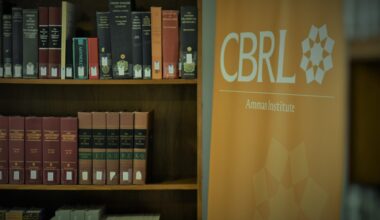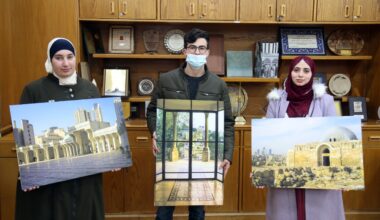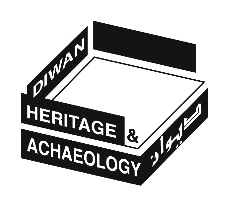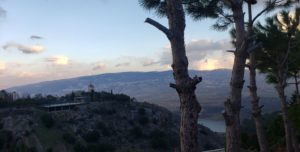
In late February, before the world so abruptly changed with the impact of the Coronavirus crisis, we (Nebras and Carol) were thrilled to be invited to participate in an international workshop in the West Beka’a, Lebanon on ‘Heritage for Global Challenges’. The workshop was organised by team members from Praxis: Arts and Humanities for Global Challenges, a four-year international project funded by the Arts and Humanities Research Council (AHRC), led by Professor Stuart Taberner (University of Leeds). Praxis has as its goal: to ‘champion the distinctive contribution that Arts and Humanities research can make to tackle urgent global development challenges, focusing on heritage in particular’.
The workshop brought together research representatives from 28 AHRC Global Challenges Research Fund (GCRF) and Newton Fund projects along with other external partners and organisations as well as Praxis team members; 57 participants from 12 countries in total. Since 2015, the GCRF and Newton funding has provided opportunities for researchers to work in a wide range of partnerships with the aim of contributing to the UN’s Sustainable Development Goals (SDGs) in ‘low and middle income countries’ (LMIC).
The workshop’s location of the West Beka’a, a fertile valley in eastern Lebanon, was a deliberate choice by the organisers to support the area, which is Lebanon’s most important farming region possessing remarkable biodiversity. The opening event was held at a new built community centre, Homat Al Hima International Center – ‘Al Hima’ means protected area in Arabic and ‘Homat’ refers to young nature heroes. The name reflects the centre’s mission: to promote the care of this area of natural beauty by local people to generate a sustainable future for all. It is just one initiative associated with the Society for the Protection of Nature in Lebanon.
During the workshop, participants spent a half day with members of the Beka’a community in the town of Ein Zebde. We planted native Lebanese Cedar trees (A’arz, in Arabic, Cedrus libani is its scientific classification) and learned about their magnificent heritage. Well known as the national emblem of Lebanon, they possess great religious and historical significance, referenced many times in ancient literature, as well as more recently lending their name to Lebanon’s ‘Cedar Revolution’ of 2005.
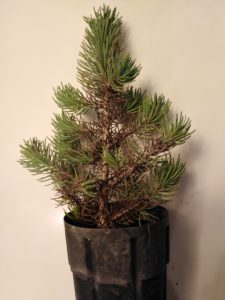
We were taken on a guided walk around the village, exploring its history, and, in the evening, we enjoyed a delicious vegetarian dinner cooked by local women using local ingredients. These community-led activities are part of an income generating tourism initiative that aims to work with and support local heritage.
CBRL Director, Carol Palmer along with Nebras Maslamani, Project Manager of Our Past Our Future All Together in Faynan (OPOF) and Project Assistant Manager of Archaeology into Business in Faynan attended the workshop alongside Gehan Selim (University of Leeds), Project Leader of two projects in Jordan (one of the OPOF project strands and ‘The Living Museum of Um Qais’).
During the three-day workshop participants presented their projects during ‘lightening talks’ and in group sessions offered feedback on others’ experiences to suggest ways to continue projects more effectively and efficiently.
We were encouraged to look ahead and explore the wider impact of heritage on the three pillars of sustainable development; social, environmental, and economic as well as consider how best to nurture interdisciplinary collaborations. Most ambitiously, we were urged to contribute to defining a future research agenda on heritage and the global challenges – that is on how heritage projects can best contribute to the sustainable development goals whilst maintaining the highest standards of research practice.
On our journey back at both airports in Beirut and Amman, the impending extent of the Coronavirus / COVID-19 pandemic was becoming increasingly evident. Now, some months later, with its profound and on-going impacts for both Jordan and Lebanon, we have even greater resolve to put into practice the lessons learned from this rich shared experience, both in Jordan and the wider Levant.
You can find out more about the PRAXIS project here. A comprehensive report on the cumulative discussions, dialogues, and feedback from the workshop was published in June by the PRAXIS team and can be found here.













